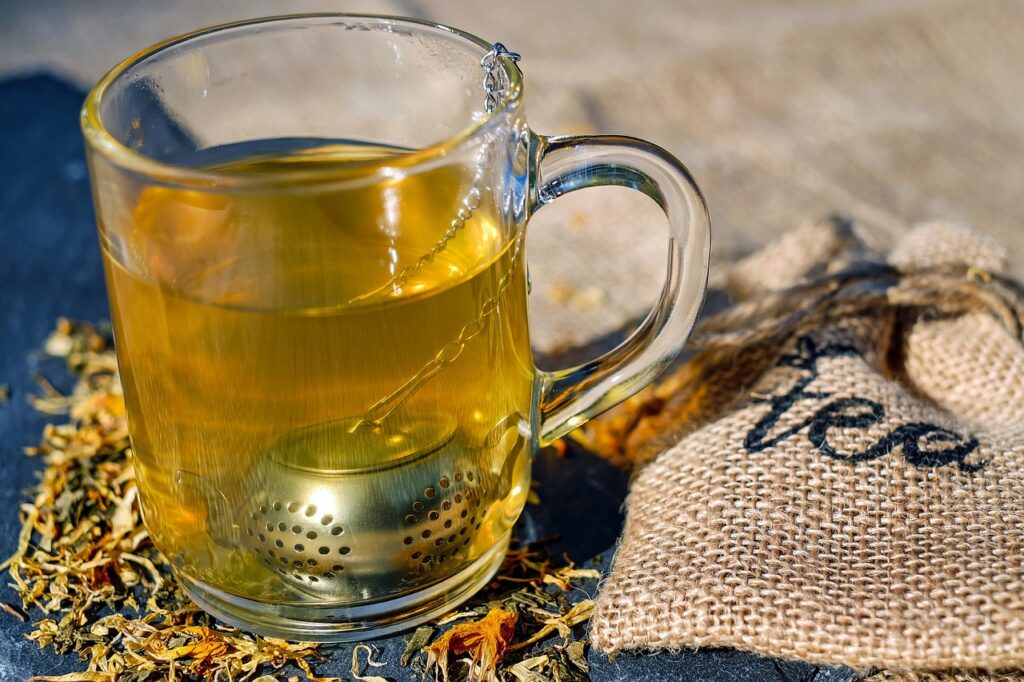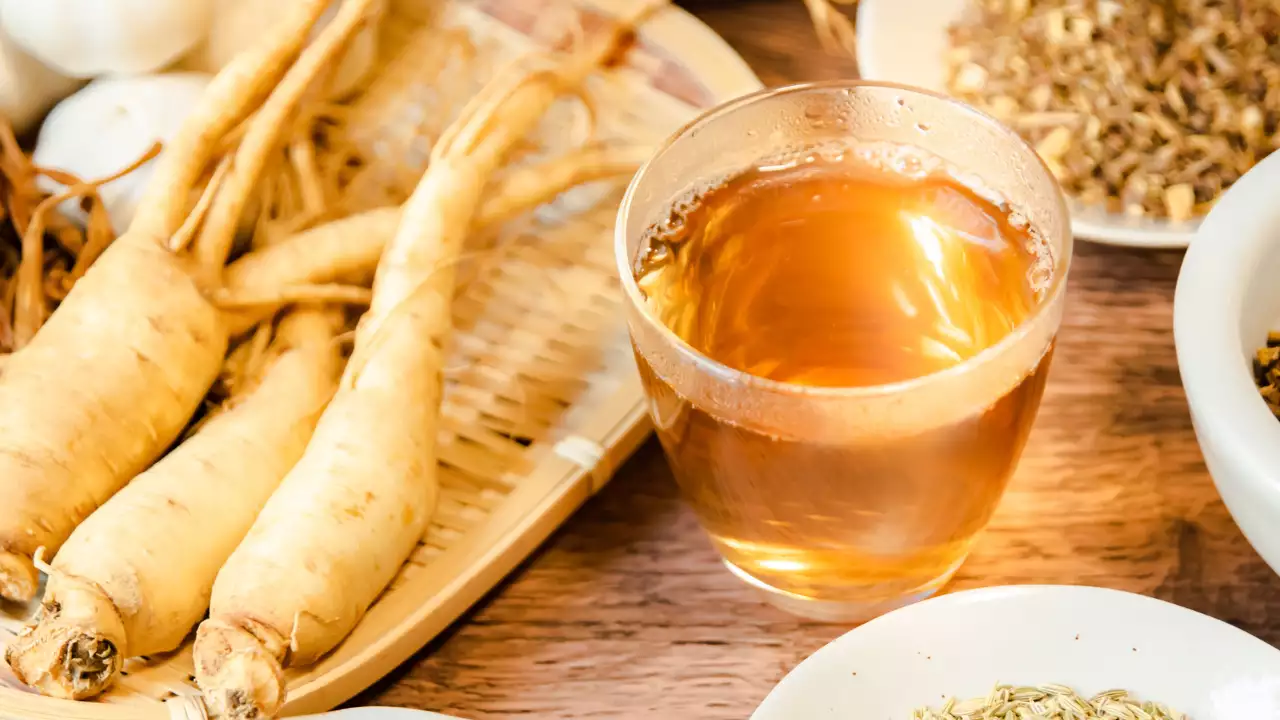In today’s fast-paced world, finding natural ways to boost energy and focus is more important than ever. Ginseng tea, celebrated for centuries in traditional medicine, offers a promising solution. From enhancing mental clarity to supporting overall well-being, discover how this herbal elixir can transform your daily routine.
What is Ginseng Tea?
Ginseng tea, derived from the roots of the ginseng plant, holds a revered status in traditional medicine for its potent health benefits. The ginseng plant belongs to the genus Panax, which means “all-healing” in Greek, reflecting its historical use as a remedy for various ailments.
Types of Ginseng: Ginseng tea primarily comes in two main varieties: American ginseng (Panax quinquefolius) and Asian ginseng (Panax ginseng). Each type possesses distinct characteristics and is valued for different health benefits.
- American Ginseng: This variety is native to North America and is often considered more calming compared to its Asian counterpart. American ginseng is prized for its ability to support immune function and reduce stress levels. It contains ginsenosides, the active compounds responsible for many of its therapeutic effects.
- Asian Ginseng: Also known as Panax ginseng, Asian ginseng is native to East Asia and has a reputation for its stimulating properties. It is widely used to enhance physical endurance, mental clarity, and overall vitality. Asian ginseng contains a higher concentration of ginsenosides, particularly Rb1 and Rg1, which contribute to its energizing effects.
Cultural and Historical Significance: Both types of ginseng have been integral parts of traditional medicine systems for centuries. In Asian cultures, especially in countries like China and Korea, ginseng is considered a symbol of health, longevity, and vitality. It has been used to combat fatigue, boost the immune system, and improve cognitive function.
Preparation and Consumption: Ginseng tea can be prepared from either dried ginseng roots or commercially available tea bags containing ginseng extracts. The tea is brewed by steeping the roots or tea bags in hot water, allowing the beneficial compounds to infuse into the liquid. The resulting brew has a slightly bitter, earthy flavor that can be enhanced with honey or lemon to suit personal taste preferences.
Quality Considerations: When selecting ginseng tea, it’s essential to consider factors like the quality of the roots, processing methods, and purity. Organic ginseng ensures minimal exposure to pesticides and chemicals, preserving its natural potency. Look for reputable suppliers who adhere to quality standards to ensure you’re getting the full benefits of ginseng tea.
The Science Behind Ginseng Tea
Scientific research supports claims that ginseng tea enhances energy levels and cognitive function. Key compounds called ginsenosides interact with the body’s systems, promoting sustained vitality without the jitters associated with caffeine.
Health Benefits of Ginseng Tea

Ginseng tea is celebrated not only for its ability to boost energy but also for a wide array of health benefits that support overall well-being. From enhancing cognitive function to promoting immune health, here’s a closer look at how ginseng tea can positively impact your health:
1. Cognitive Enhancement: Ginseng tea contains bioactive compounds known as ginsenosides, which have been studied for their cognitive-enhancing effects. These compounds may improve memory, concentration, and overall mental clarity. Regular consumption of ginseng tea has been associated with enhanced cognitive function, making it a valuable ally for tasks requiring focus and mental agility.
2. Immune System Support: One of the longstanding uses of ginseng in traditional medicine is its role in supporting the immune system. Ginsenosides found in ginseng tea have antioxidant and anti-inflammatory properties that help protect the body against oxidative stress and inflammation. By bolstering immune defenses, ginseng tea may reduce the risk of infections and support overall immune health.
3. Stress Reduction: Chronic stress can take a toll on both mental and physical health. Ginseng tea has adaptogenic properties, meaning it helps the body adapt to stress and maintain balance. Regular consumption of ginseng tea may help reduce stress levels by modulating the body’s response to stressors, thereby promoting relaxation and emotional well-being.
4. Physical Endurance and Stamina: Asian ginseng, in particular, is renowned for its ability to enhance physical endurance and stamina. Athletes and individuals seeking to improve physical performance often use ginseng tea to boost energy levels and combat fatigue. The energizing effects of ginseng tea can contribute to improved athletic performance and overall vitality.
5. Cardiovascular Health: Studies suggest that ginseng tea may benefit cardiovascular health by improving blood circulation and reducing cholesterol levels. Ginsenosides in ginseng tea help dilate blood vessels, promoting better blood flow and supporting heart health. Regular consumption of ginseng tea may contribute to lower blood pressure and reduced risk of heart disease.
6. Mood Enhancement: In addition to its physical benefits, ginseng tea may positively influence mood and emotional well-being. The adaptogenic properties of ginseng help regulate stress hormones and neurotransmitters in the brain, potentially improving mood and reducing symptoms of anxiety and depression.
7. Anti-Aging Properties: Ginseng tea is rich in antioxidants that help neutralize free radicals and protect cells from damage. Antioxidants play a crucial role in slowing down the aging process and maintaining youthful skin. Regular consumption of ginseng tea may contribute to a more radiant complexion and overall skin health.
8. Digestive Health: Ginseng tea has been traditionally used to support digestive health, aiding in digestion and alleviating symptoms of indigestion. The anti-inflammatory properties of ginseng may help soothe gastrointestinal discomfort and promote a healthy digestive system.
Choosing the Right Ginseng Tea
Not all ginseng teas are created equal. Understanding the types and quality ensures you reap maximum benefits. Opt for reputable sources offering organic options to avoid pesticides and ensure potency.
How to Prepare Ginseng Tea
Brewing the perfect cup of ginseng tea is essential to unlocking its full potential as an energizing and health-promoting beverage. Follow these simple steps to ensure you enjoy a flavorful and beneficial cup of ginseng tea:
1. Choose Your Ginseng Tea: Selecting the right type of ginseng tea sets the foundation for a satisfying brew. Ginseng tea is available in various forms, including dried ginseng roots, tea bags, and powdered extracts. Opt for high-quality products from reputable suppliers to ensure maximum potency and freshness.
2. Gather Your Materials: You’ll need the following essentials to prepare ginseng tea:
- Freshly boiled water
- Ginseng tea (tea bags or dried roots)
- Teapot or mug with a lid
- Optional: Honey, lemon, or other flavorings to taste
3. Boil the Water: Start by bringing fresh, filtered water to a boil. The ideal water temperature for brewing ginseng tea depends on the type and form of ginseng used. For tea bags or powdered ginseng extracts, boiling water (around 100°C or 212°F) is suitable. If using delicate dried ginseng roots, slightly lower the temperature to around 85-90°C (185-194°F) to avoid boiling off delicate compounds.
4. Steep the Ginseng Tea: Place one ginseng tea bag or approximately 1-2 grams of dried ginseng roots into a teapot or mug. Pour the hot water over the tea and cover with a lid to trap the aroma and essential oils. Steep the tea for 2-5 minutes, depending on your desired strength and flavor profile. Longer steeping times will yield a stronger brew.
5. Enjoy Your Ginseng Tea: After steeping, remove the tea bag or strain out the ginseng roots using a tea strainer. Ginseng tea has a slightly bitter and earthy flavor profile, which can be enhanced with a touch of honey or a squeeze of fresh lemon. Enjoy your ginseng tea hot, or let it cool and serve over ice for a refreshing iced version.
6. Tips for Brewing Ginseng Tea:
- Quantity: Adjust the amount of ginseng tea used based on personal preference and desired strength.
- Timing: Follow the recommended steeping times to avoid bitterness or overpowering flavors.
- Enhancements: Experiment with adding natural sweeteners like honey or agave syrup, or flavor enhancers like cinnamon or ginger, to customize your ginseng tea experience.
7. Storage and Serving Suggestions: Store any leftover brewed ginseng tea in a sealed container in the refrigerator for up to 24 hours. Serve chilled or reheat gently before consuming. For optimal freshness and potency, prepare ginseng tea in small batches as needed.
Incorporating Ginseng Tea into Your Daily Routine
Integrating ginseng tea into your daily life is simple. Start your day with a cup for sustained energy, or enjoy it in the afternoon to combat the post-lunch slump. Avoid consuming it close to bedtime to prevent sleep disturbances.
Recipes and Variations with Ginseng Tea
Explore creative recipes and refreshing variations that showcase the versatility of ginseng tea. From ginseng iced tea to tea-infused smoothies, these recipes offer innovative ways to enjoy its benefits while satisfying your taste buds.
Potential Side Effects and Considerations

While ginseng tea is generally regarded as safe for most people when consumed in moderate amounts, it’s essential to be aware of potential side effects and considerations before incorporating it into your routine. Here are some key points to keep in mind:
1. Insomnia and Restlessness: Ginseng tea, particularly Asian ginseng, contains compounds that can act as stimulants. Consuming ginseng tea too close to bedtime may interfere with sleep patterns, leading to insomnia or restlessness. To avoid sleep disturbances, it’s recommended to consume ginseng tea earlier in the day or limit intake in the late afternoon and evening.
2. Digestive Upset: Some individuals may experience mild digestive side effects when first introducing ginseng tea into their diet. These may include stomach upset, nausea, or diarrhea. Starting with small amounts and gradually increasing consumption can help minimize these effects. If digestive issues persist, discontinue use and consult a healthcare professional.
3. Interactions with Medications: Ginseng tea can interact with certain medications and health conditions. If you are taking prescription medications, particularly blood thinners, diabetes medications, or stimulants, consult with your healthcare provider before consuming ginseng tea. Ginseng may enhance or inhibit the effects of these medications, potentially leading to adverse reactions.
4. Allergic Reactions: Individuals with known allergies to ginseng or related plants, such as celery or other botanicals in the Araliaceae family, should avoid ginseng tea to prevent allergic reactions. Symptoms of an allergic reaction may include itching, rash, swelling, or difficulty breathing. Seek immediate medical attention if you experience any allergic symptoms after consuming ginseng tea.
5. Pregnancy and Breastfeeding: Pregnant and breastfeeding women should exercise caution when consuming ginseng tea. While there is limited research on the effects of ginseng tea during pregnancy, it is generally advised to avoid high doses or prolonged use due to potential risks to fetal development. Consult with a healthcare provider before incorporating ginseng tea into your diet during pregnancy or while breastfeeding.
6. Hypoglycemia Risk: Ginseng tea may lower blood sugar levels, which can be beneficial for individuals with diabetes but may pose risks for those prone to hypoglycemia (low blood sugar). Monitor blood glucose levels closely when using ginseng tea alongside diabetes medications or insulin therapy. Adjustments to medication dosages may be necessary under medical supervision.
7. Quality and Sourcing: To ensure safety and efficacy, choose ginseng tea products from reputable suppliers who adhere to quality standards. Look for organic options to minimize exposure to pesticides and contaminants. Avoid ginseng teas that contain additives, fillers, or undisclosed ingredients, as these may compromise product quality and potency.
8. Duration of Use: While ginseng tea is considered safe for short-term use, prolonged consumption may lead to tolerance or dependence on its stimulating effects. To prevent potential issues, consider cycling periods of use with breaks to allow the body to reset. Individual tolerance levels may vary, so listen to your body’s signals and adjust consumption accordingly.
9. Consultation with Healthcare Provider: If you have underlying health conditions, such as cardiovascular disease, hypertension, or hormonal imbalances, or if you are undergoing medical treatments, consult with a healthcare provider before adding ginseng tea to your wellness regimen. Your healthcare provider can provide personalized guidance based on your medical history and individual health needs.
Conclusion: Embrace the Power of Ginseng Tea
Embrace the power of ginseng tea as your go-to energy elixir and experience a natural boost like never before. Whether you’re looking to enhance mental clarity, support immune function, or simply improve overall well-being, ginseng tea offers a natural and effective solution.
FAQ
Q: Can ginseng tea help with weight loss?
A: While ginseng tea may support metabolism and energy levels, it’s not a magic solution for weight loss. Incorporating it into a balanced diet and active lifestyle may contribute to overall wellness.
Q: How often should I drink ginseng tea?
A: It’s generally safe to consume ginseng tea daily, but moderation is key. Aim for 1-3 cups per day to enjoy its benefits without exceeding recommended limits.
Q: Is ginseng tea safe during pregnancy?
A: Pregnant women should consult with their healthcare provider before consuming ginseng tea, as it may affect pregnancy outcomes.
Q: Can ginseng tea interact with medications?
A: Yes, ginseng tea can interact with certain medications, including blood thinners and diabetes medications. Consult your doctor if you’re taking prescription drugs.
Q: How does ginseng tea compare to coffee in terms of energy boost?
A: Ginseng tea provides a more sustained energy boost compared to coffee, without the abrupt crash often associated with caffeine.

